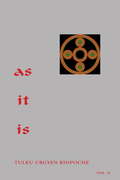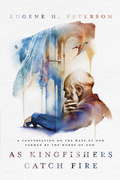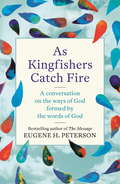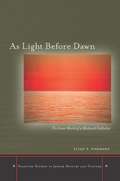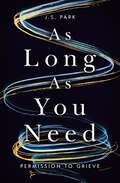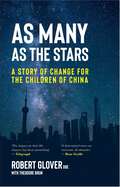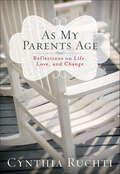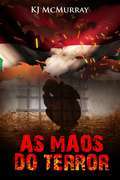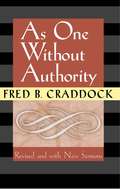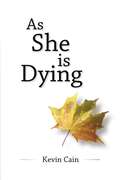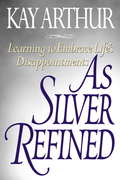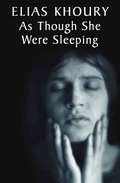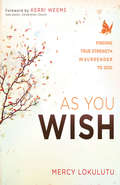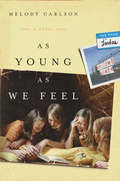- Table View
- List View
As It Is, Volume II
by Tulku Urgyen RinpocheThe collection of teachings presented in As It Is, Volume II, is selected fromtalks given by the Tibetan meditation master Tulku Urgyen Rinpoche between1994 and 1995. The emphasis in Volume I was on the development stagepractice; Volume II focuses primarily on the completion stage.Tulku Urgyen Rinpoche was someone with extraordinary experience andrealization, a fact known throughout the world. It is evident to everyonethat he was unlike anyone else when it came to pointing out the nature ofmind, and making sure that people both recognized it and had some actualexperience.-Khenchen Thrangu RinpocheTulku Urgyen Rinpoche was an incredible master, one who was both learnedand accomplished. The great masters of this time-the 16th Karmapa,Dudjom Rinpoche and Dilgo Khyentse Rinpoche-all venerated him as oneof their root gurus and a jewel in their crown ornament. He was someone whoachieved the final realization of the Great Perfection.-Orgyen Tobgyal RinpocheThe difference between buddhas and sentient beings is that sentient beingsare busy fabricating. Our self-existing wakefulness has fallen under the powerof being altered. As long as we continue to do so, we will wander in samsara.Rather than doing that, we need to recognize the nature of mind. I amexplaining this here to give you the idea of how things are. The next step isfor you to experience. Intellectual understanding is not enough. You need toactually taste and realize this self-existing wakefulness. Train till it becomesuninterrupted
As Kingfishers Catch Fire: A Conversation on the Ways of God Formed by the Words of God
by Eugene H. PetersonLiving Out the Word Made Flesh “Sixty years ago I found myself distracted,” Eugene Peterson writes. “A chasm had developed between the way I was preaching from the pulpit and my deepest convictions on what it meant to be a pastor.” And so began Peterson’s journey to live and teach a life of congruence—congruence between preaching and living, between what we do and the way we do it, between what is written in Scripture and how we live out that truth. Nothing captures the biblical foundation for this journey better than Peterson’s teachings over his twenty-nine years as a pastor. As Kingfishers Catch Fire offers a never-before-published collection of these teachings to anyone longing for a richer, truer spirituality. Peterson’s strikingly beautiful prose and deeply grounded insights usher us into a new understanding of how to live out the good news of the Word made flesh. This is one man’s compelling quest to discover not only how to be a pastor but how to be a human being.
As Kingfishers Catch Fire: A Conversation on the Ways of God Formed by the Words of God
by Eugene Peterson'Sixty years ago I found myself distracted.' So begins the introduction to As Kingfishers Catch Fire. What follows is the record of the collaboration of pastor and congregation in acts of worship and a life together. What Eugene Peterson, for thirty years pastor of a Maryland church, discovered is that the pastor's life is much more than just the preaching. It is also made up of attending to the details in all the circumstances and relationships specific to a people and a place - prayers at a hospital bed, conversations with the elderly, small talk on a street corner. This collection of spiritual writings presents Peterson's distinctive approach designed to communicate to his congregation, and the reader, 'the full counsel of God.' Seven sections containing seven teachings, each expertly crafted to stir the biblical imagination. In these teachings, Peterson walks the reader through Scripture to bring fresh insight to familiar names such as Moses, David, Isaiah, Solomon, Peter, Paul, and John of Patmos.
As Light Before Dawn: The Inner World of a Medieval Kabbalist
by Eitan P. FishbaneAs Light Before Dawn explores the mystical thought of Isaac ben Samuel of Akko, a major medieval kabbalist whose work has until now received relatively little attention. Through consideration of an extensive literary corpus, including much that still remains in manuscript, this study examines an array of themes and questions that have great applicability to the comparative study of mysticism and the broader study of religion. These include prayer and the nature of mystical experience; meditative concentration directed to God; and the power of mental intention, authority, creativity, and the transmission of wisdom.
As Long as Space Endures: Essays on the Kalacakra Tantra in Honor of H.H. the Dalai Lama
by Robert A. Thurman Edward A. ArnoldThe Kalacakra Tantra (Kalacakra means "wheel of time") is a tradition of Buddhist theory and practice whose root text treats a fantastic expanse of knowledge ranging from observations of the cosmos to investigations of meditative states and vital bodily energies. In the Tibetan-speaking world, a public Kalacakra initiation remains the most sought-after event in the life of a devout Buddhist. The Fourteenth Dalai Lama has long had a strong connection with the Kalacakra Tantra; he brought the initiation to the West in 1981, performing it in the United States, Switzerland, Spain, and Australia. This volume has been created to celebrate his long involvement with the Kalacakra teachings. The twenty-five contributors, scholars who have made tantric studies their specialty, have contributed translations of works by great Indian and Tibetan Kalacakra masters, analyses of historical figures, methods of practice, essays on medicine ritual expertise, and ethical discipline. The collection also includes practical advice for Western students and practitioners from contemporary Tibetan Kalacakra masters.
As Long as You Need: Permission to Grieve
by J. S. Park"A heartfelt invitation for grieving readers...An excellent resource for those working their way through loss." —Publishers Weekly, Starred ReviewVeteran hospital chaplain to the sick, dying, and bereaved, J.S. Park offers you both the permission and the process for how to grieve and heal at your own pace.In As Long As You Need, J.S. offers an honest and unrushed engagement with grief, decoding four types of grieving—spiritual, mental, physical, and relational—and offering compassionate self-care and soul-care along the way.If you are struggling to process loss, pain, or grief from the last few years or the last few minutes, J.S. is an experienced and deeply empathetic listener and grief catcher who has held the pain and questions of thousands of patients. While social and cultural narratives about grief are dominated by "letting go, moving on, or turning the page" in his nearly decade of service as a chaplain at a major hospital with a designated level one trauma center J.S. understands firsthand how rushing or suppressing grief only adds a suffocating layer of pain on top of the original wound.From his unique window into the stories of the ill, injured, dying, and their families, J.S. offers you:Permission to dismantle all too common myths about grief and replace them with a guilt-free and unrushed approach to navigating your losses.Encouragement for how entering grief, rather than avoiding it, leads to a hard but meaningful holding of your loss.Empathy and hope if you are struggling with a crisis of faith in the midst of grief.Recognition that grief spans a wide narrative of loss: loss of future, faith, mental health, worth, autonomy, connection, and loved ones.Affirmation that your grief is your own. While the DNA of grief might be universal to the human condition, how you experience and process grief is unique to you. From the ER to deliveries to deathbeds across every sort of illness and injury imaginable, J.S. Park has provided meaningful counseling for people in all walks of life and death. Now, through his book he wants to assure you that, while everybody else might rush past your pain, grief is the voice that says, take as long as you need.
As Many as the Stars
by Robert Glover'There are a few rare occasions in life, when events seem to conspire in a profound and extraordinary way. In those moments God pulls back the curtain on his plans and you get to see a glimpse of what he has in store in you. In the end you are clearer on your life's purpose and destiny. This was one of those moments.'AS MANY AS THE STARS tells the story of how one man moved with his wife and six young children from the UK to China to follow God's call. Robert Glover was a social worker in the East of England who went on to radically transform Chinese government's policy on care welfare. In conversations with the Chinese government Robert fought to show that family-based fostering and adoption was a better alternative to the system of state-sponsored orphanages. In 1998, Robert pioneered the first small pilot project in Shanghai. In the same year Care for Children was founded as a charity as the first joint venture social welfare project between the British and Chinese governments. The goal was to provide skills and knowledge to local staff that could eventually impact many thousands of orphans in China. Robert had a big vision but continued to trust God in his plans. Now Robert's charity Care for Children has reached their goal of getting ONE MILLION children fostered or adopted, which is 85% of the children in the state-run institutions and they have since expanded into Thailand and Vietnam.Told with humour & simplicity AS MANY AS THE STARS gives a deeper understanding of the importance of families in God's plan; God's deep concern for the plight of the orphan and the poor; how to live with greater compassion, generosity and courage to share the love of Christ with a needy world.
As Many as the Stars
by Robert Glover'There are a few rare occasions in life, when events seem to conspire in a profound and extraordinary way. In those moments God pulls back the curtain on his plans and you get to see a glimpse of what he has in store in you. In the end you are clearer on your life's purpose and destiny. This was one of those moments.'AS MANY AS THE STARS tells the story of how one man moved with his wife and six young children from the UK to China to follow God's call. Robert Glover was a social worker in the East of England who went on to radically transform Chinese government's policy on care welfare. In conversations with the Chinese government Robert fought to show that family-based fostering and adoption was a better alternative to the system of state-sponsored orphanages. In 1998, Robert pioneered the first small pilot project in Shanghai. In the same year Care for Children was founded as a charity as the first joint venture social welfare project between the British and Chinese governments. The goal was to provide skills and knowledge to local staff that could eventually impact many thousands of orphans in China. Robert had a big vision but continued to trust God in his plans. Now Robert's charity Care for Children has reached their goal of getting ONE MILLION children fostered or adopted, which is 85% of the children in the state-run institutions and they have since expanded into Thailand and Vietnam.Told with humour & simplicity AS MANY AS THE STARS gives a deeper understanding of the importance of families in God's plan; God's deep concern for the plight of the orphan and the poor; how to live with greater compassion, generosity and courage to share the love of Christ with a needy world.
As My Parents Age: Reflections on Life, Love, and Change
by Cynthia RuchtiFor most of us it is not the "ifs" but the "whens": when I notice the first signs; when we mourn the role reversal; when my children need me too; or when I don't know how to pray. Those are just a few of the fifty-two reflections on the changes, challenges, and blessings of loving your parent as they grow older. Their lives -- and yours -- begin to change. Knowing that you are not alone, that others have been where you are, is encouraging and uplifting. This is not a how-to, but a me-too, as you see yourself and your own situation lived out in the stories of others.
As Mãos do Terror
by Kj Mcmurray Jotta Reis & Lucas A P ReisAs Mãos do Terror Osama bin laden está morto e as tropas norte-americanas estão se retirando do Iraque e Afeganistão, sinalizando um fim às guerras. Acabou a ameaça do terrorismo global? Nesse momento em que o mundo sinaliza esperança de paz mundial, surge um grupo terrorista que pode ser a pior organização que o mundo já presenciou. Seus motivos são definidos em nada menos do que o controle do mundo. A agente operacional da CIA, Marie Jenson, usando um disfarce, vai se infiltrar no grupo ISIS arriscando não só a vida, mas tudo o que tem de mais precioso. Forçada a provar sua lealdade, Marie terá que mobilizar um ataque, no entanto está em uma corrida contra o tempo para parar este ataque antes que aconteça um desastre. Copyright © 2017 KJ McMurray Todos os direitos reservados. Proibida reprodução integral ou parcial em livro de qualquer espécie ou outra forma de publicação sem autorização expressa do autor.
As One Without Authority: Revised and with New Sermons
by Fred B. CraddockThis update of Craddock's original work on inductive preaching remains one of the most important contributions to homiletic scholarship. Revised with three new sermons, inclusive language, and NRSV texts, it is still as fresh and provocative as ever.
As Seen on TV
by Meredith SchorrFans of the Hallmark Channel and Gilmore Girls will adore this delightful rom‑com about a city girl who goes in search of small-town happiness, only to discover life—and love—are nothing like the TV movies.Emerging journalist Adina Gellar is done with dating in New York City. If she&’s learned anything from made-for-TV romance movies, it&’s that she&’ll find love in a small town—the kind with harvest festivals, delightful but quirky characters, and scores of delectable single dudes. So when a big-city real estate magnate targets tiny Pleasant Hollow for development, Adi knows she&’s found the perfect story—one that will earn her a position at a coveted online magazine, so she can finally start adulting for real . . . and maybe even find her dream man in the process. Only Pleasant Hollow isn&’t exactly &“pleasant.&” There&’s no charming bakery, no quaint seasonal festivals, and the residents are more ambivalent than welcoming. The only upside is Finn Adams, who&’s more mouthwatering than the homemade cherry pie Adi can&’t seem to find—even if he does work for the company she&’d hoped to bring down. Suddenly Adi has to wonder if maybe TV got it all wrong after all. But will following her heart mean losing her chance to break into the big time?
As Sementes Irão Germinar Em Algum Lugar
by Ulrike Maria Lislaine M. OliveiraEstive pensando sobre equilíbrio em meus textos durante este ano movimentado. Olhei o manuscrito do meu futuro novo livro para ver que assuntos eu poderia estar negligenciando e que trabalho ainda precisava ser feito.Não mantive um tópico específico em mente quando escrevia a cada dia; eu só escrevia sobre o que estava em meus pensamentos e no meu coração, e sobre questões que vinham diariamente. Assim como na vida de qualquer pessoa, tenho que lidar com as minhas experiências quando surgem.Este livreto é a compilação de pensamentos que cogitei durante esse tempo e diligentemente trabalhei para entender essas ideias e conceitos. Quero compartilhar essas sementes de pensamento com você para elas germinarem em solo fértil. Nutra-as bem - elas irão mudar sua vida!~ "Deixe seus pensamentos anjos estarem sempre com você" ~
As She Is Dying
by Kevin CainAsk any Appalachian the question, “When is Appalachia most beautiful?” Every Appalachian will answer, “During autumn, when the leaves of Appalachia’s trees are dying.” Appalachians believe the beauty of their landscape is almost heaven. With the honor of officiating nearly 1000 funerals, Pastor Kevin Cain offers life in the midst of death. In As She Is Dying, Kevin Cain writes, “I have given my life to bring hope to a people who have little reason to hope. Maybe Appalachians have allowed our hills’ majesty and grandeur to blind us from coal dust and addiction. Yet, I do see hope. I see hope in what is dying. I see hope in what is dead. I see hope in what remains. Yes, death has the keen ability to either clear up, cover up or stir up. Still, sometimes we must descend in order to turn into the clouds. As She Is Dying is a book about death that offers stories of life. In these pages, you will find a little bit of wisdom, some stories of hope, and the eulogizing words of my mouth and the meditations of my heart which I trust have been acceptable in the sight of my strength and my Redeemer. Somehow and somewhere in death, hope must be discovered. Maybe, through the literal metaphor of Appalachians’ deaths, you can see life. Some were reconciled long before their deaths. Some were reconciled just prior to their deaths. And, others were reconciled in the midst of death. There is hope for all…hope’s breath, even in death.”
As Silver Refined: Learning to Embrace Life's Disappointments
by Kay ArthurARE YOU DISAPPOINTED THAT LIFE ISN'T TURNING OUT LIKE YOU PLANNED? HOW DO YOU RESPOND when your husband or wife tramples your emotions? When your boss fires you unexpectedly? When you lose your life's savings? When the child you've loved and prayed for turns his back on you and your values? When disappointments like these smash their way into your life, you may want to scream, "How could God let this happen?"BUT WHAT IF GOD didn't just "let it happen"? What if the things you call disappointments are really His appointments -- events He is using to make you more like Christ? What if He is using your disappointments like flames to melt and burn away the undesirable elements in your life, leaving you pure and radiant -- like refined silver?YOU CAN BE DEFEATED by life's unavoidable disappointments, or you can become stronger because of them. Kay Arthur paints a graphic picture of the dangerous downward spiral of disappointment that can lead to discouragement, depression, or even despair. But you can learn to break that cycle and embrace disappointment with a faith that recognizes the trials of life as tools that God uses to make you -- as silver refined -- a reflection of His goodness.From the Trade Paperback edition.
As Sure as the Dawn (Mark of the Lion #3)
by Francine RiversWhen Atretes wins his freedom from the gladiator's arena, he finds his long-lost son in the care of a young Christian widow. But Rome's corrupt political powers soon force him to fight again---this time for himself and his newfound family.
As Though She Were Sleeping
by Elias KhouryMeelya's dreams are her refuge from events that threaten her or escape her understanding. She leaves her home in Lebanon to live in Nazareth with her Palestinian husband, but Mansour - an older man who fell for her beauty - is frustrated by her spiritual absence.When Mansour's brother's death demands a move to Jaffa - the centre of early tensions between Jewish settlers and displaced Palestinians - Meelya withdraws further into the realm of dreams. Expecting the birth of their son, Mansour can only watch as she cuts loose from the physical world.Over three traumatic nights, past, present and future merge seamlessly into a series of visions that draw the reader towards a conclusion that is powerfully symbolic of the ongoing troubles in the Middle East.
As Time Goes By (Tales From Grace Chapel Inn #46)
by Annie JonesOn the Sunday after Christmas, Rev. Thompson makes a plea in his sermon for his congregants to step up when they hear the Lord's call. The Howard sisters take the pastor's words to heart and wait, ready and eager. But when their calls come, they are surprised at the unexpected territory they must visit. Jane must help a blustering newcomer settle into Acorn Hill, Alice takes on a paid speaking engagement and Louise gets involved in helping young married couples. Persevering in their tasks, they open themselves to new experiences and to surprising insights about love, patience and kindness. Once you visit the charming village of Acorn Hill, tucked away in rural Pennsylvania, you'll never want to leave. Townsfolk relax on their porch swings or gather to discuss the day's events at the Coffee Shop over homemade pie. It's the kind of town where friendship and faith flow together like a wide river on a fine spring day. And you'll love spending time with the Howard sisters, who have begun a new life together in their childhood home, a gracious Victorian house that is now a bed-and-breakfast called Grace Chapel Inn. Here they rekindle old memories, rediscover the bonds of sisterhood, revel in the blessings of friendship and meet many fascinating guests along the way.
As Waters Gone By
by Cynthia RuchtiEmmalyn and Max Ross may have to endure the fight of their lives to mend the tattered fabric of their marriage. His actions ensured she could never be a mother and put him in prison, giving their relationship a court-mandated five-year time-out. On a self-imposed exile to beautiful but remote Madeline Island, one of the Apostle Islands of Lake Superior, Emmalyn has just a few months left to figure out if and how they can ever be a couple again. Nudged along by the exuberant owner of the Wild Iris Inn and Café, a circle of misfit people in their small town, and a young girl who desperately needs someone to love her, Emmalyn restores an island cottage that could become a home and begins to restore her heart by learning what it means to love unconditionally. Yet even as hope begins to find a place within the cottage walls, Emmalyn still wonders if she's ready for Max's release. She may be able to rebuild a cottage, but can she rebuild a marriage?
As Waters Gone By
by Cynthia RuchtiEmmalyn Ross never thought a person could feel this alone. Sustaining a marriage with a man who's not by her side is no easy task, especially since her husband currently resides behind impenetrable prison walls. His actions stole her heart's desire and gave their relationship a court-mandated five-year time-out. What didn't fall apart that night fell apart in the intervening years. Now, on a self-imposed exile to Madeline Island--one of the Apostle Islands of Lake Superior--Emmalyn starts rehabbing an old hunting cottage they'd purchased when life made sense. Restoring it may put a roof over her head, but a home needs more than a roof and walls, just as a marriage needs more than vows and a license. With only a handful of months before her husband is released, Emmalyn must figure out if and how they can ever be a couple again. And his silence isn't helping.
As We Understood: A Collection of Spiritual Insights
by Al-Anon Family GroupsThis book is a collection of spiritual writings by members of Al-Anon Family Groups. Al-Anon Family Groups is for those who have been effected by someone's drinking. From the preface: "What gives hope to Al-Anon/Alateen members? Many have experienced situations that others would find unbearable, yet they develop strength and hope for the future. "I looked around me at group meetings and saw a few people as hurt and bitter and angry as I was," said one member, "but most were facing life as it came. They were able to accept what I thought were outrageous situations. And I wanted to learn how they did it."
As You Wish
by Robin Jones GunnBack in the U.S. after a year abroad, Christy is reunited with her friends. When a couple close to her ends their marriage, it causes her to rethink her relationship with Todd. Will life turn out like she wishes? Christy and Todd: College Years book 2.
As You Wish: Finding True Strength in Surrender to God
by Mercy LokulutuSurrender may seem like the least likely path to a victorious life, but in the kingdom of God it happens to be the only way. We’ve been conditioned to think that surrender makes us weak. But nothing is further from the truth. Surrender to God gives you access to the very life you are searching for. It gives you the power to overcome suffering, it unlocks your identity, and it helps you realize that the past cannot hold you, trials cannot destroy you, and your future is sure. With inspirational stories and practical tips, As You Wish shows you how to surrender to God, do less on your own, and rely on Him to accomplish more than you ever thought possible. Jesus did not only speak about surrender; He also lived it. He asks us to do the same. Let go of your plans, liberate your aspirations, and release the dreams you have for your life. Love the Lord your God with reckless abandon, without reservation or personal agenda. This is surrender. Every day it’s saying to God, “As You wish.”
As Young As We Feel
by Melody CarlsonOnce upon a time in the little town of Cliffton, Oregon, there were four Lindas. Enjoy this engaging first novel in the Four Lindas series from bestselling author Melody Carlson.
